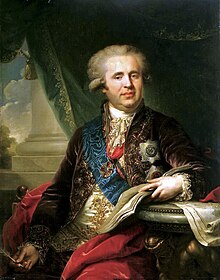Alexander Andreevich Besborodko

Prince Alexander Andrejewitsch Besborodko ( Russian Александр Андреевич Безбородко , born March 17, 1747 in Gluchow ; † April 1799 in Saint Petersburg ) was a Russian statesman, most recently chancellor .
Life
Alexander Andrejewitsch Besborodko came from a lineage of the Little Russian Cossack nobility . His parents were General Andrei Jakowlewitsch Besborodko (1711-1780) and Eudokia Mikhailovna Zabiela (1716-1803). He had three sisters and one brother, Count Elias Andrejewitsch Besborodko (1756-1815), Russian general and senator.
His training began in his parents' house before he moved to the Kiev Academy . In 1765 Besborodko entered the civil service. He became governor under the Ukrainian Governor General Count Pyotr Alexandrovich Rumjanzew-Sadunaiski . In 1767 he became a member of the Little Russian Court, but resigned under the impression of the Russo-Turkish War , switched to the army and advanced to the Bug with the 18th Neschinsky Hussar Regiment . He distinguished himself several times in the war, including the Battle of Cahul . For his services he was promoted to colonel on March 22, 1774.
At the same time as his brother Besborodko was raised to the rank of imperial count by the German Emperor Joseph II .
After his arrival in Moscow in 1775, Besborodko became the most important and influential of the State Secretaries of Catherine the Great in the shadow of Vice Chancellor Count Osterman . Important foreign policy issues were dealt with by him and brought to a conclusion to the satisfaction of the Empress and for the benefit of Russia. These included various agreements on international shipping in the years 1780 to 1783 or alliance or non-aggression treaties with Austria and Prussia in 1792 or Great Britain in 1794. He is also one of the architects of the third division of Poland in 1795.
Besborodko had already advanced to the rank of major general in 1781, received the Grand Cross of the Order of St. Vladimir I Class in 1782 and had been a member of the Russian Academy since 1783. In 1784 he became a real privy councilor and received the Alexander Nevsky Order , at the same time he was promoted to the Ministry of Foreign Affairs and received the salary of a vice chancellor. In 1786 he held the position of chamberlain. During the empress' stay in Kiev, he received Francisco de Miranda for her at the beginning of his visit to Russia.
After the accession of Paul I Bezborodko was in 1797 appointed Chancellor and elevated to the rank of prince and an honorary member of the 307 on 8 July 1797 under no. Livonian Knighthood added. Due to illness he was incapacitated as early as 1798. His visit to resign was not granted, instead he was given leave of absence, but did not recover. Until his death he rose to the rank of field marshal. He was also awarded the Order of Saint Anne I Class and the Order of Saint Andrew the First Called . He was buried in the cemetery of the Alexander Nevsky Monastery . His statue is on the National Monument Thousand Years of Russia .
family
Besborodko never entered the state of marriage, although he was always inclined to women. From his relationship with the dancer Olga Dmitrijewna Karatygina he had a daughter, Natalia Veretsky (1790-1826). In 1806 she was married to Colonel Saveliev with a large dowry and after her death she was buried in the Tolschewsk monastery. His sole heir became his brother, who continued the lineage .
literature
- Georg Adolf Wilhelm von Helbig: Russian favorites , Tübingen 1809, pp. 399–408
Web links
| personal data | |
|---|---|
| SURNAME | Besborodko, Alexander Andreevich |
| ALTERNATIVE NAMES | Безбородко, Александр Андреевич (Russian) |
| BRIEF DESCRIPTION | Russian statesman, most recently Chancellor |
| DATE OF BIRTH | March 17, 1747 |
| PLACE OF BIRTH | Gluchow |
| DATE OF DEATH | April 1799 |
| Place of death | St. Petersburg |
